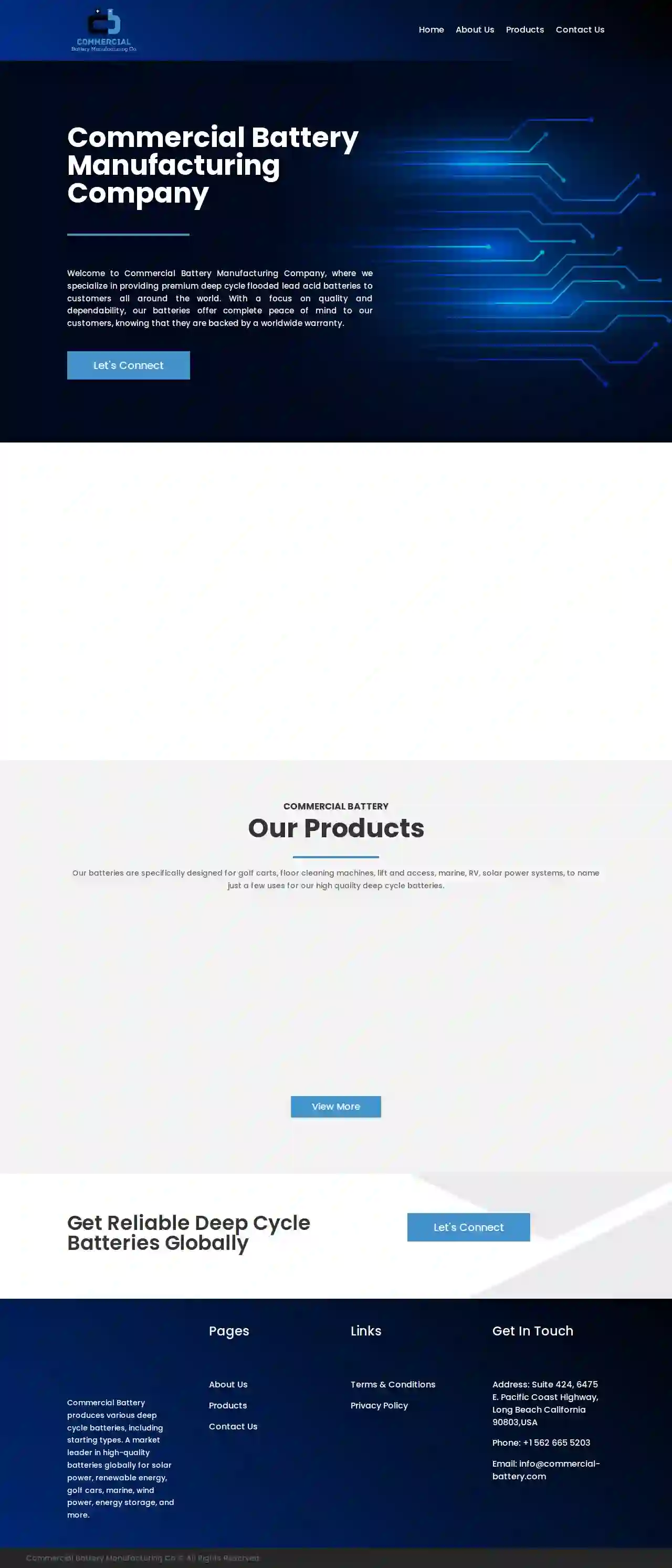Commercial Solar Installers Antioch
Top Commercial Solar Energy in Antioch
Get up to 3 Solar Panels For Businesses quotes for your project today! Compare profiles, reviews, accreditations, portfolio, etc... and choose the best service.

San Diego Solar Installers
52 reviewsSan Diego, CA, 501 W Broadway, 92101, USSan Diego Solar Installers is a leading provider of solar energy solutions in San Diego County. They offer personalized solar panel installation services, tailored to meet individual energy needs. Their team of experienced solar installers can help homeowners save money on energy bills, reduce their carbon footprint, and increase their home value. They provide ongoing maintenance and support for optimal solar system performance.
- Services
- Why Us?
- Accreditations
- Our Team
- Testimonials
- Gallery
Get Quote
Commercial Battery Manufacturing Company
Long Beach, California, Suite 424, 6475 E. Pacific Coast Highway, 90803, USCommercial Battery Manufacturing Company specializes in providing premium deep cycle flooded lead acid batteries to customers worldwide. With a focus on quality and dependability, our batteries offer complete peace of mind to our customers, knowing that they are backed by a worldwide warranty.
- Services
- Why Us?
- Accreditations
- Our Team
- Testimonials
- Gallery
Get Quote
Suntegrity Solar
515 reviewsSanta Rosa, CA, Sonoma County, 95404, USSuntegrity Solar is a locally owned and operated Sonoma solar company that has been serving the North Bay, including Sonoma County, Napa County, and Marin County, since 1977. The company is dedicated to providing high-quality solar energy solutions, trusted advice, and outstanding customer service to the communities it serves. Suntegrity Solar is an Enphase Platinum Installer and REC Pro Installer, with over 800 solar systems installed since focusing exclusively on solar in 2009.
- Services
- Why Us?
- Accreditations
- Our Team
- Testimonials
- Gallery
Get Quote
Cyberdyne Solar Company San Diego
4.744 reviews402 West Broadway, Suite 400, San Diego, CA, 92101, USCyberDyne Solar is a locally owned and operated company based in San Diego, California. They specialize in solar P/V system installations, replacements, consulting, and maintenance. Their commitment to the customer experience, quality of work, and expertise sets them apart from other solar companies. They offer the best equipment and prices on the market and are dedicated to making the solar process the best experience possible.
- Services
- Why Us?
- Accreditations
- Our Team
- Testimonials
- Gallery
Get Quote
HES Solar
4.9229 reviewsSuite A, 8585 Aero Dr, San Diego, 92123, USRevolutionizing the way the world is powered, Southern California's Leading Solar Energy and Storage Provider. We partner with the top solar production and storage equipment manufacturers to ensure you will have an integrated solar system of the best components, engineered and tested for industry-leading production output and reliability. HES Solar's commercial and residential systems ensure component compatibility and eliminate efficiency drains. We use components with best-in-class manufacturer warranties, installed by Southern California's top solar installer with our own full-coverage workmanship warranty. We take the worry out of your energy production. LEARN MORE. Mission Statement: HES SOLAR IS PARTNERING WITH OUR CUSTOMERS TO FUNDAMENTALLY IMPROVE THE WAY THE WORLD IS POWERED. Join our mission to bring clean, reliable solar energy to homes, businesses, manufacturing, and commercial properties throughout Southern California. You'll partner with the top team of design, installation, management, support, and technology experts. Take the first step today to save money, ensure energy security, claim independence over utility rate changes, and reduce the carbon footprint of your home or business.
- Services
- Why Us?
- Accreditations
- Our Team
- Testimonials
- Gallery
Get Quote
Daylight Solar Energy
Ontario, USWelcome to Daylight Solar Energy, a company founded on the principle of bringing our customers the best quality products in the market and the industry's most qualified solar installers. We emphasize on high quality installations and complete follow through on everything we promised. Our mission is to provide CLEAN & AFFORDABLE ENERGY FOR ALL OF US. We believe that solar energy is a powerful renewable energy source that can provide electricity to not just every home in the United States, but every home on the planet. Our team of experts is dedicated to helping our customers harness the power of the sun and reduce their carbon footprint. With our state-of-the-art technology and expertise, we can help you save money on your energy bills and contribute to a sustainable future.
- Services
- Why Us?
- Gallery
Get Quote
Smart Coast Energy LLC
4.69 reviewsN/A, 1529 E Palmdale Blvd suite 112, Palmdale, 93551, USSmart Coast Energy is a local renewable energy company passionate about bringing the power of the sun to every home in the community. They provide a wide range of professional services to meet your needs, promising to provide every service with a smile and to your highest level of satisfaction. They offer a variety of options including financing options and Power Purchase Agreement (PPA) to make sustainable living accessible to everyone.
- Services
- Why Us?
- Accreditations
- Our Team
- Testimonials
- Gallery
Get Quote
Sacramento Solar Pro's
Suite 101, 123 Solar Way, Sacramento, 95834, USSacramento Solar Pros is a local solar panel cleaning company that offers professional services in the Greater Sacramento Area and surrounding cities. They are fully licensed and insured, committed to providing excellent service. They use high-quality solar panel cleaner products that are specifically designed for safely maintaining your investment, protecting it from dirt buildup which may block sunlight from reaching your panels or reducing energy efficiency by up to 90%.
- Services
- Why Us?
- Accreditations
- Our Team
- Testimonials
- Gallery
Get Quote
Rooms Covers 'N Solar
3.648 reviews123 Main St, Suite 100, Anaheim, 92801, USRooms, Covers 'N Solar is a family-owned and operated business with over 45 years of experience in the patio cover industry. They are dedicated to providing customers with the style of patio product they are looking for, laid out to their specifications and professionally installed. Their products include solid flat plans, open lattice, insulated roof panels, combinations, free standing, multi-level, equinox louvered, deluxe standard, gabled room, garden room, patio room, screen room, sun room, under existing structure, and solar panels. They offer a free in-home estimate and have a fully built-out and decorated showroom.
- Services
- Why Us?
- Accreditations
- Our Team
- Testimonials
- Gallery
Get Quote
Univercity Solar
55 reviews242 E Airport Dr, San Bernardino, 92408, USUniverCity Solar is a leading provider of solar solutions, offering both residential and commercial services. They are dedicated to helping individuals and businesses harness renewable energy and reduce operating costs. Their team of experts ensures a seamless and hassle-free experience from start to finish.
- Services
- Why Us?
- Accreditations
- Our Team
- Testimonials
- Gallery
Get Quote
Over 4,210+ Solar Contractors in our network
Our solar installers operate in Antioch and beyond!
SolarCompaniesHub has curated and vetted Top Solar Installers in and around Antioch. Find a top & trustworthy contractor today.
Frequently Asked Questions About Commercial Solar Installations
- You pay a fixed monthly lease payment for the use of the solar system.
- You do not own the system.
- You are responsible for maintenance and repairs.
- You typically do not benefit from tax incentives or depreciation.
- You purchase the electricity generated by the solar system at a fixed rate per kilowatt-hour (kWh).
- You do not own the system.
- The third-party owner is responsible for maintenance and repairs.
- You may not be eligible for all tax benefits.
- Use a Directory Like SolarCompaniesHub: We specialize in connecting businesses with qualified Commercial Solar Installers.
- Ask for Referrals: Get recommendations from other businesses that have gone solar.
- Check Online Reviews: Research installers on Google, Yelp, and other review sites.
- Verify Credentials: Make sure the installer is licensed, insured, and certified (e.g., NABCEP in the US).
- Get Multiple Quotes: Compare quotes from at least 3-4 installers, evaluating their experience, warranties, and proposed system design.
- Ask Questions: Don't hesitate to ask about their project management process, experience with similar projects, and safety protocols.
What happens to my solar panels if I sell my business?
What is a net metering agreement, and why is it important?
What is the difference between a solar lease and a PPA?
Solar Lease:
PPA:
How do I find a reliable commercial solar installer?
What happens to my solar panels if I sell my business?
What is a net metering agreement, and why is it important?
What is the difference between a solar lease and a PPA?
Solar Lease:
- You pay a fixed monthly lease payment for the use of the solar system.
- You do not own the system.
- You are responsible for maintenance and repairs.
- You typically do not benefit from tax incentives or depreciation.
PPA:
- You purchase the electricity generated by the solar system at a fixed rate per kilowatt-hour (kWh).
- You do not own the system.
- The third-party owner is responsible for maintenance and repairs.
- You may not be eligible for all tax benefits.
How do I find a reliable commercial solar installer?
- Use a Directory Like SolarCompaniesHub: We specialize in connecting businesses with qualified Commercial Solar Installers.
- Ask for Referrals: Get recommendations from other businesses that have gone solar.
- Check Online Reviews: Research installers on Google, Yelp, and other review sites.
- Verify Credentials: Make sure the installer is licensed, insured, and certified (e.g., NABCEP in the US).
- Get Multiple Quotes: Compare quotes from at least 3-4 installers, evaluating their experience, warranties, and proposed system design.
- Ask Questions: Don't hesitate to ask about their project management process, experience with similar projects, and safety protocols.